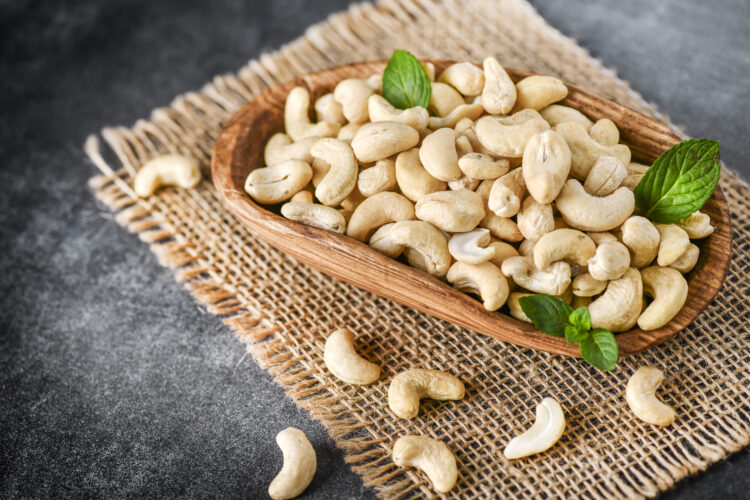
We often consume dried nuts as part of our daily meals. These nuts, like cashews, not only offer delicious and creamy flavors but a range of health effects as well. When consumed in moderation as part of a balanced diet, cashews can offer several health benefits. Here are 15 science-backed effects of eating cashews.
Improved Heart Health

Cashews are not only tasty but are also a rich source of monounsaturated and polyunsaturated fats. These fats promote heart health by reducing bad cholesterol (LDL) levels and increasing good cholesterol (HDL) levels. Cashews are also rich in antioxidants and minerals like magnesium. Regularly consuming them can lower blood pressure.
Weight Management

Although cashews are calorie-dense, they are also a healthy snack option for weight management. Being high in protein and fiber, they make you feel fuller for longer hours. Consuming these nuts mindfully can reduce the overall calorie intake, thus promoting weight loss and maintenance. However, it is important to consume them as part of a balanced diet.
Bone Health Enhancement

Cashews have a rich nutrient profile, offering enough calcium, magnesium, and phosphorus. Regular consumption of these minerals helps to keep our bones strong and healthy. Consuming cashews regularly can improve calcium absorption and bone structure. They can also reduce the risk of osteoporosis and fractures. Cashews ensure adequate intake of bone-building nutrients.
Lowers Risk Of Diabetes

Cashews have a low glycemic index. Consuming them regularly releases sugar in the blood stream slowly and more gradually. They are beneficial compared to high-glycemic foods. Besides that, cashews have healthy fats and protein that stabilize blood sugar levels. It may also improve insulin sensitivity and reduce the risk of type 2 diabetes.
Digestive Benefits

Cashews are rich in both soluble and insoluble fiber. These flavorful and crunchy nuts are important for digestive health. The soluble fiber content softens stool and regulates bowel movements, while the insoluble fiber adds bulk to stool, thus promoting regular clearance. Cashews also contain certain compounds that promote beneficial gut bacteria growth.
Immune System Improvement

Another surprising science-backed effect of cashews is for our immune system. These nuts contain various nutrients such as zinc, calcium, and iron. All of these together are known to improve the immune function of the body. Consuming cashews as part of a balanced diet helps fight infections and illnesses more effectively.
Elevates Energy Level

Cashews are rich in nutrients like magnesium, B vitamins, and good fats. Consuming them regularly in moderation improves the level of energy in your body. They play an important role in making you remain more active throughout the day. Making cashews a part of your balanced diet also helps fight fatigue and increase overall energy levels.
Cognitive Function Improvement

Cashews are a rich source of L-arginine, vitamin E, magnesium, and calorie-dense fats. They play an important role in improving memory, maintaining focus, and enhancing overall brain health. Consuming cashews regularly also improves blood flow to the brain, thus increasing oxygen and nutrient supply.
Cholesterol Level Moderation

Since cashews are rich in phytosterols and monounsaturated and polyunsaturated fatty acids, they can impact cholesterol levels. When consumed in moderation, they can reduce LDL (bad) cholesterol while maintaining/increasing HDL (good) levels. However, people have a misconception that cashews can increase cholesterol levels and must be avoided if dealing with the same.
Lowers Gallstone risk

The National Health Service suggests that regular consumption of nuts, especially cashews, can reduce the risk of gallstones. Since cashews contain high fiber content, they may have potentially beneficial effects on bile acid metabolism. Gallstones usually form due to excess cholesterol, and since cashews reduce LDL (bad) cholesterol, they can be beneficial.
Skin Health Support

Cashews are a rich source of nutrients like copper and antioxidants (vitamin E) that can improve skin health. Consuming them regularly is important for collagen synthesis, which will help to maintain skin elasticity and youthfulness. Cashews also help protect the skin from oxidative damage and promote a healthy complexion.
Alleviates Migraine Symptom

Cashews are high in magnesium and thus have been known to relieve migraine symptoms. Studies suggest that 1 ounce of magnesium-rich foods per day can reduce the frequency and severity of migraine attacks. Besides that, cashews contain riboflavin (vitamin B2), which is beneficial for those dealing with excessive migraine issues.
Anti-Inflammatory Properties

Cashews are rich in various bioactive compounds, antioxidants, and anti-inflammatory substances. These nuts contain carotenoids and polyphenols, which may reduce inflammation in the body. Consuming cashews regularly can help with chronic inflammation and improve health conditions. Cashews may also decrease levels of inflammation markers in the blood.
Allergic Reactions

Cashews are a common allergen. Some individuals may experience Pollen Food Allergy Syndrome (PFAS), also called Oral Allergy Syndrome (OAS), after consuming cashews. The symptoms may range from itching, swelling, breathing difficulties, hives, and a scratchy throat. The symptoms might turn severe, and lead to anaphylaxis.
Excess Calorie Intake

While cashews offer numerous health benefits, they are also calorie-dense and high in fat. Consuming them in excessive amounts without considering overall calorie intake can lead to weight gain and other health issues. Moderation is key to enjoying the benefits of cashews without overdoing it.

Comments
Loading…